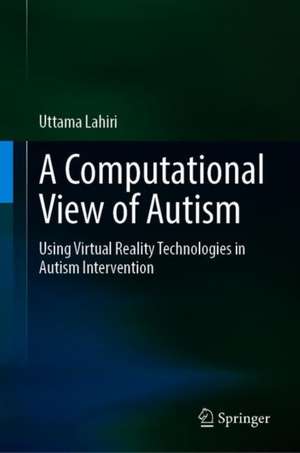A Computational View of Autism: Using Virtual Reality Technologies in Autism Intervention
Autor Uttama Lahirien Limba Engleză Hardback – 28 iul 2020
This book first explains autism, its prevalence, and some conventional intervention techniques, and it then describes how virtual reality technology can support autism intervention and skills training. The approaches and technologies covered include immersive virtual reality, augmented reality and mixed reality. The tasks covered include emotion recognition, affective computing, teaching communication skills, imparting literacy skills, training for imitation skills, and joint attention skills. Most of the chapters assume no prerequisite knowledge of autism or virtual reality, and they are supported throughout with detailed references for further investigation.
While the author is an engineer by profession, with specialist knowledge in robotics and computer-based platforms, in this book she adopts a user perspective and cites many real-life examples from her own experience. The book is suitable for students of cognitive science, and researchers and practitioners engaged with designing and offering technological assistance for special needs training.
While the author is an engineer by profession, with specialist knowledge in robotics and computer-based platforms, in this book she adopts a user perspective and cites many real-life examples from her own experience. The book is suitable for students of cognitive science, and researchers and practitioners engaged with designing and offering technological assistance for special needs training.
| Toate formatele și edițiile | Preț | Express |
|---|---|---|
| Paperback (1) | 924.80 lei 6-8 săpt. | |
| Springer International Publishing – 29 iul 2021 | 924.80 lei 6-8 săpt. | |
| Hardback (1) | 930.91 lei 6-8 săpt. | |
| Springer International Publishing – 28 iul 2020 | 930.91 lei 6-8 săpt. |
Preț: 930.91 lei
Preț vechi: 1163.63 lei
-20% Nou
Puncte Express: 1396
Preț estimativ în valută:
178.19€ • 193.61$ • 149.77£
178.19€ • 193.61$ • 149.77£
Carte tipărită la comandă
Livrare economică 21 aprilie-05 mai
Preluare comenzi: 021 569.72.76
Specificații
ISBN-13: 9783030402365
ISBN-10: 3030402363
Ilustrații: XIII, 173 p. 52 illus., 46 illus. in color.
Dimensiuni: 155 x 235 mm
Greutate: 0.44 kg
Ediția:1st ed. 2020
Editura: Springer International Publishing
Colecția Springer
Locul publicării:Cham, Switzerland
ISBN-10: 3030402363
Ilustrații: XIII, 173 p. 52 illus., 46 illus. in color.
Dimensiuni: 155 x 235 mm
Greutate: 0.44 kg
Ediția:1st ed. 2020
Editura: Springer International Publishing
Colecția Springer
Locul publicării:Cham, Switzerland
Cuprins
- Autism and Its Prevalence. - Conventional Intervention Techniques. - Role of Technology in Autism Intervention. - Scope of Virtual Reality to Autism Intervention. - Design of Virtual Reality-Based Applications in Autism Intervention. - Technology-Assisted Skills Training: The Way Forward.
Textul de pe ultima copertă
This book first explains autism, its prevalence, and some conventional intervention techniques, and it then describes how virtual reality technology can support autism intervention and skills training. The approaches and technologies covered include immersive virtual reality, augmented reality and mixed reality. The tasks covered include emotion recognition, affective computing, teaching communication skills, imparting literacy skills, training for imitation skills, and joint attention skills. Most of the chapters assume no prerequisite knowledge of autism or virtual reality, and they are supported throughout with detailed references for further investigation.
While the author is an engineer by profession, with specialist knowledge in robotics and computer-based platforms, in this book she adopts a user perspective and cites many real-life examples from her own experience. The book is suitable for students of cognitive science, and researchers and practitionersengaged with designing and offering technological assistance for special needs training.
Caracteristici
Explains autism, its prevalence, and some conventional screening and intervention techniques with real-life examples Describes how virtual reality technology can support autism intervention and skills training Suitable for students of cognitive science, and researchers and practitioners engaged with designing and offering technological assistance for special needs training
